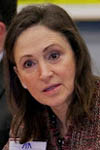Nonlawyer Ownership Interests in Law Firms Remains an Unsettled Issue for Ethics 20/20 Commission
Corrected: The ABA Commission on Ethics 20/20 still is undecided on whether it will make a recommendation on whether nonlawyers should be allowed to have some form of limited ownership interest in U.S. law firms.
In recent months, the commission’s work on the issue has focused on what the substance of such a recommendation might be. On Dec. 2, the commission released a discussion paper (PDF) on alternative law practice structures that outlines one possible approach to nonlawyer ownership—but it does not amount to an actual recommendation.
The commission also posted initial draft proposals (PDF) on choice-of-law issues affecting fee-sharing when law firms operating in multiple jurisdictions are governed by different rules on nonlawyer ownership.
The commission is asking for comments on both documents by Feb. 29. (Comments may be sent to senior research paralegal Natalia Vera at [email protected].)
But after a lengthy discussion at today’s meeting of the commission, it’s evident that there is no clear consensus among commission members on whether they should bring any recommendation at all to the ABA’s policy-making House of Delegates calling for revisions to the association’s Model Rules of Professional Conduct that would let nonlawyers hold limited ownership interests in law firms. (The Model Rules are the direct basis for lawyer conduct rules in every state except California.)
“It’s very hard to predict, and I’m not a betting man,” said Theodore Schneyer, a professor emeritus at the University of Arizona’s James E. Rogers College of Law, who is one of the commission’s Alternative Business Structures Working Group co-chairs. The other co-chair is George W. Jones Jr., a partner at Sidley Austin in Washington, D.C.
The commission met in New Orleans, where the ABA is holding its 2012 midyear meeting through Monday.
Some commission members support the concept of limited nonlawyer ownership in recognition of the changing nature of law firms as business and professional entities. Other commission members, however, have expressed concerns about what the impact would be on the internal operations of law firms and how they would be regulated.
Alternative law practice structures currently are prohibited in every U.S. jurisdiction except the District of Columbia. They are becoming more common, however, in foreign jurisdictions, notably the United Kingdom, Canada and Australia. American law firms doing business overseas are in a quandary over how to balance the more permissive rules on business structures in other countries and the more restrictive regulations in U.S. jurisdictions.

Carolyn Lamm
Photo by Kathy Anderson
“We can’t ignore what happened in the U.K. and Australia,” said Carolyn B. Lamm, a partner at White & Case in Washington, D.C., who appointed the commission when she was ABA president in 2009. In those countries, she said, demands by consumer groups opened the door to increased legislative regulation of law firms.
“Does the ABA want to abdicate leadership because an issue is too tough, and leave it to legislatures and the courts? No,” Lamm said.
But some commission members said that proposing even limited nonlawyer ownership in law firms might be premature. Commission co-chair Michael Traynor was among those who suggested that it might be more appropriate for the commission to issue a white paper analyzing the issue. Traynor, of Berkeley, Calif., is a past president of the American Law Institute. His co-chair, Jamie S. Gorelick, is a partner at Wilmer Cutler Pickering Hale and Dorr in Washington, D.C.
The District of Columbia permits lawyers to share a management or financial interest, or both, with nonlawyers in entities that are limited to providing legal services. The approach articulated in the commission’s discussion paper would largely follow the District of Columbia model, but go beyond it in two key ways: First, lawyers in a firm would retain controlling voting rights and financial interests in the firm; and second, the lawyers would make reasonable efforts to establish a nonlawyer’s professional integrity before that person may gain a financial interest in the firm.
The commission already has decided against further consideration of publicly traded law firms, passive outside investment in or ownership of law firms, or multidisciplinary practices that offer both legal and nonlegal services.
The commission will have to come to terms with the nonlawyer ownership issue within the next few months. Any recommendation would go to the House of Delegates in a year for consideration at the 2013 midyear meeting. Reports to the House will be due before the end of this year.
Updated Feb. 7 to correct Sidley Austin’s name.
Correction
Updated Feb. 7 to correct Sidley Austin’s name.



